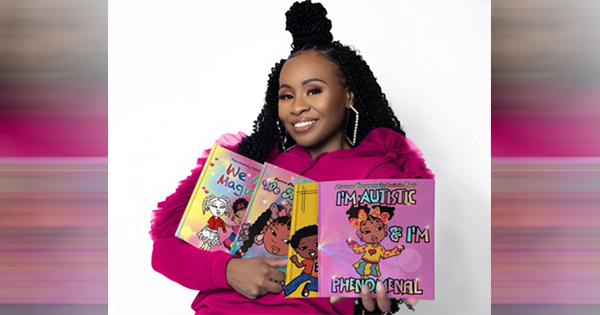Nationwide — Ayanna Davis, an African American woman known as “Phenomenally Autistic,” has recently illustrated her 30th children’s book. She is an award-winning artist and Autism Advocate. Via her books and other initiatives, Ayanna champions for Black Autistics to gain recognition, information, and access to resources to improve their well-being with being Autistic.
At just seven years old, Ayanna produced her first art show, where she also sold her first piece. Through art, Davis has found a medium to express herself when the challenges of Autism seem insurmountable.
While she lives with five autoimmune disorders and has endured over 300 seizures, Ayanna remains steadfast in promoting messages of self-love, diversity, and inclusion through her advocacy, books, and art.
Her latest book, I’m Autistic and I’m Phenomenal, is a story that addresses the complexities and joys of living as an Autistic. From the vantage point of a Black girl, a navigation through the process of understanding and acceptance of the condition takes place.
Ayanna’s art, advocacy, and illustrations reflect that representation is important with respect to all young people. Her reverent depictions and storytelling of Black, Autistic girlhood are designed to instill acceptance of the image of themselves, and confidence to accomplish their dreams. Their skin tone and hair are beautiful, and they can do anything!
In addition to her Autistic characters, Ayanna has created characters with vitiligo, albinism, limb differences, and more.
Her extraordinary work was recognized in Westchester County, NY, where she was presented with a proclamation, which made April 26th “Ayanna’s Day.” She was presented her second proclamation on May 8th in her hometown by the city’s first Black woman mayor. Ayanna was also the first Autistic Black woman to receive the prestigious honor.
Ayanna comments, “I always sensed my differences, but lacked understanding. I was often perceived as the ‘weird, awkward Black girl,’ when in reality my struggles stemmed from anxiety and overstimulation. The face of Autism was never that of a Black girl’s – so that was the last thing anyone assumed about me. I was living in a world with a mind that wasn’t wired for me.”
She continues, “People try to change us but often don’t realize it would be easier to just leave a little space for us to let us be ourselves. It can be a very beautiful thing if you give people a chance. I’m not weird, I’m autistic, and there’s nothing wrong with that. People are in denial about how they treat people who are different. I hope to draw people to my pages for the art, and maybe stay for some advocacy.”

